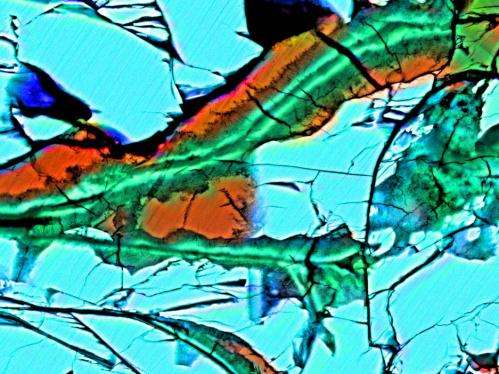October 23, 2013 report
Meteorite study suggests Mars' ancient atmosphere may be locked in its rocky terrain

(Phys.org) —A team of researchers from the U.K. and the Netherlands has found evidence of carbonation in a meteorite that was found in the U.S. back in 1931—prior research has proven that the meteorite is actually a rock that was blown off the surface of Mars and landed on Earth approximately, 3000 years ago. This suggests, the researchers argue in their paper published in the journal Nature Communications, that Mars' long ago atmosphere may not have escaped as has been suggested, but may instead be locked in its surface.
Scientists believe that Mars once had a carbon dioxide rich atmosphere but it was mostly lost approximately three to four billion years ago. Why it was lost has remained a mystery—possibilities include problems with the planet's magnetic field, the solar wind, a strike by a massive foreign body, or according to the researchers with this new study, it may have simply been soaked up by the surface.
The Mars rock, known as the Lafayette meteorite made its way to Earth after an explosive event caused massive amounts of rocky material to be ejected from Mars into space. The rock itself has been found to be approximately 1.3 billion years old, is basalt based and is believed to have been formed by a volcano on the red planet. But, the researchers contend, something happened to the rock between the time it was formed and the time it was blown into space—they've found that siderite formed in the rock (due to interactions with olivine and feldspar) likely due to carbonation—the process by which minerals absorb carbon dioxide in the presence of water. That suggests of course that carbon dioxide in the atmosphere was being pulled into rocks on the surface and also that there was water present. If such carbonation happened on a large enough scale, it could mean, the researchers suggest, that some or most of Mar's ancient atmosphere has been sequestered in its surface. They also note that learning how Mars lost its atmosphere could provide new insights into how Earth's atmosphere is maintained or how it could be disrupted by global warming due to greenhouse gas emissions.
More information: Sequestration of Martian CO2 by mineral carbonation, Nature Communications 4, Article number: 2662 DOI: 10.1038/ncomms3662
Abstract
Carbonation is the water-mediated replacement of silicate minerals, such as olivine, by carbonate, and is commonplace in the Earth's crust. This reaction can remove significant quantities of CO2 from the atmosphere and store it over geological timescales. Here we present the first direct evidence for CO2 sequestration and storage on Mars by mineral carbonation. Electron beam imaging and analysis show that olivine and a plagioclase feldspar-rich mesostasis in the Lafayette meteorite have been replaced by carbonate. The susceptibility of olivine to replacement was enhanced by the presence of smectite veins along which CO2-rich fluids gained access to grain interiors. Lafayette was partially carbonated during the Amazonian, when liquid water was available intermittently and atmospheric CO2 concentrations were close to their present-day values. Earlier in Mars' history, when the planet had a much thicker atmosphere and an active hydrosphere, carbonation is likely to have been an effective mechanism for sequestration of CO2.
Journal information: Nature Communications
© 2013 Phys.org





















